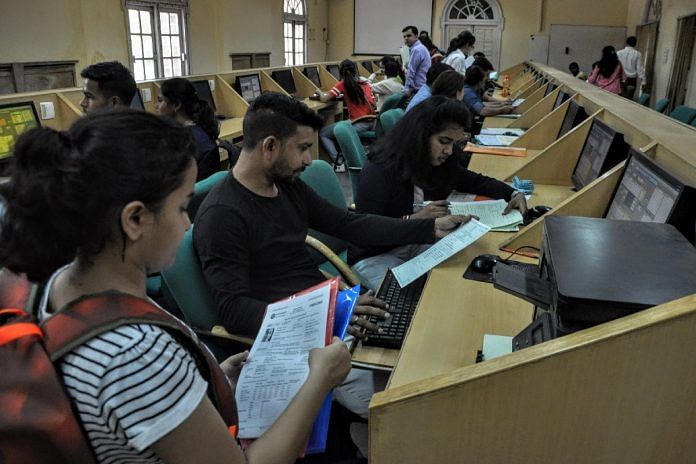New Delhi: ‘Why are there more temples than palaces in India’, ‘significance of architecture in Ramayana and Mahabharata’, and ‘ancient cities of the Indus Saraswati region’ — these are some of the topics students will now be encouraged to study as part of incorporation of Indian Knowledge Systems (IKS) in higher-education institutes (HEIs).
In a draft titled ‘Guidelines for Incorporating Indian Knowledge in Higher Education Curricula’, released on 13 April, the University Grants Commission (UGC) laid down topics and rules based on which institutions are required to create and provide a curriculum on IKS.
The incorporation of Indian Knowledge Systems at all levels of education is one of the tenets of the new National Education Policy (NEP) 2020.
In addition to this, students will now also study Indian mathematics — numbers, fractions, geometry, decimal nomenclature in Vedas, ancient Indian surgical methods, ancient astronomy, and Sanskrit.
“The Indian Knowledge System (IKS) has evolved over thousands of years in our country and is passed on from generation to generation. IKS has become an integral part of Indian civilization and culture. Indians have contributed widely to different disciplines of knowledge, such as mathematics, medicine, metallurgy, law, astronomy, languages and literature, economics, social sciences, etc,” UGC chairman M. Jagadesh Kumar told ThePrint.
“Exposure to IKS in school and university-level education will help our students recognise that India has been a knowledge society for millennia,” he added.
Indian astronomy, Ayurveda, Vedic mathematics
The guidelines include 18 foundational courses and 19 elective courses.
According to the draft guidelines, every student enrolled in an undergraduate or post graduate programme will be encouraged to take credit courses in IKS amounting in all to at least five per cent of the total mandated credits.
In addition to this, at least 50 per cent of the credits apportioned to the IKS should be related to the major discipline, this means a student pursuing a degree in architecture may take the course ‘Indian Architecture and Town Planning’.
According to the draft, in the subject titled ‘Indian Architecture and Town Planning’, students will study topics like prevalence of high Indian architecture in almost all parts of India, except the Ganga plains, examples of high Indian architecture from ancient and mediaeval periods from different parts of India, the building of Jaipur in the 18th century, how temple art and architecture continues to flourish in modern India.
Among the foundational courses are subjects like the study of Vedangas — six auxiliary disciplines of Hinduism developed for better understanding of the four Vedas — in a chapter titled ‘Foundational Literature of Indian Civilisation’. Another sub-chapter under this, ‘Indian Language Sciences’, will teach students about language sciences and preservation of the Vedic corpus.
There’s a chapter on the ‘Indian Astronomy’ that will teach students about nakshatras (constellations) and grahas (planets), while as part of ‘Indian Health Sciences’, students will gain knowledge of ancient surgical practices and basic concepts of the Ayurveda.
IKS mandate also requires teachers at HEIs to share the life and work of contemporary scholars and innovators who have made seminal contributions in their fields using IKS.
To connect with the oral tradition of IKS, the teachers need to incorporate one practical session on the ancient technique of memorisation with a few examples from primary texts, in addition to introduction of immersive sessions on Yoga, Meditation, Ayurveda, Classical Music, Indian craft traditions, etc.
“UGC has recently introduced IKS in UGC-NET to encourage students to do doctoral research in IKS. Such research efforts will help our students link IKS to contemporary knowledge advancements to evolve new approaches for solutions to present-day challenges,” Kumar said.
(Edited by Anumeha Saxena)
Also Read: Survey of students, limiting access to database — how NAAC is initiating reform with ‘quick fixes’



